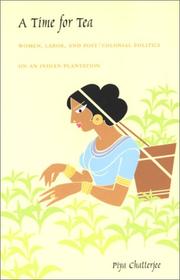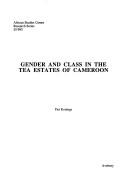| Listing 1 - 10 of 11 | << page >> |
Sort by
|
Book
Year: 2022 Publisher: London : UCL Press,
Abstract | Keywords | Export | Availability | Bookmark
 Loading...
Loading...Choose an application
- Reference Manager
- EndNote
- RefWorks (Direct export to RefWorks)
What does the collapse of India's tea industry mean for Dalit workers who have lived, worked and died on the plantations since the colonial era? Plantation Crisis offers a complex understanding of how processes of social and political alienation unfold in moments of economic rupture. Based on long-term ethnographic fieldwork in the Peermade and Munnar tea belts, Jayaseelan Raj - himself a product of the plantation system - offers a unique and richly detailed analysis of the profound, multi-dimensional sense of crisis felt by those who are at the bottom of global plantation capitalism and caste hierarchy. Tea production in India accounts for 25 per cent of global output. The colonial era plantation system - and its two million strong workforce - has, since the mid-1990s, faced a series of ruptures due to neoliberal economic globalisation. In the South Indian state of Kerala, otherwise known for its labour-centric development initiatives, the Tamil speaking Dalit workforce, whose ance stors were brought to the plantations in the 19th century, are at the forefront of this crisis, which has profound impacts on their social identity and economic wellbeing. Out of the colonial history of racial capitalism and indentured migration, Plantation Crisis opens our eyes to the collapse of the plantation system and the rupturing of Dalit lives in India's tea belt. Praise for Plantation Crisis 'Raj's well-crafted ethnography offers profound and moving insight into the experience of Tamil Dalit plantation workers as they become alienated not just from their labour and its product, but from their families, communities, settlements and selves. An excellent read.' - Tania Li, University of Toronto 'An important, insightful and compelling story of the alienation of Tamil Dalit plantation workers, the disjuncture between economic and social mobility, the production of stigma and the role of caste and class, the failure of unions alongside that of the state and corporations, the destru ction of labour organisation yet the possibility of finding resistance. Not only a major contribution to the South Asian literature but also a decolonisation "must read".' - Alpa Shah, London School of Economics
Tea plantations --- Tea plantation workers --- Tea plantation workers --- Dalits --- Tea trade --- Dalits. --- Tea plantation workers --- Tea plantations. --- Tea trade. --- History. --- Economic conditions. --- Social conditions. --- History. --- Social conditions. --- India.
Book
Year: 1950 Publisher: Wageningen H. Veenman en Zonen
Abstract | Keywords | Export | Availability | Bookmark
 Loading...
Loading...Choose an application
- Reference Manager
- EndNote
- RefWorks (Direct export to RefWorks)
Fundamental scientific research into the influence of climatic conditions on pruning and picking in production districts of Assam Tea.
Tea --- Crops and climate --- Tea plantation workers --- Influence of climate
Book

Year: 2009 Publisher: Dhaka : Society for Environment and Human Development,
Abstract | Keywords | Export | Availability | Bookmark
 Loading...
Loading...Choose an application
- Reference Manager
- EndNote
- RefWorks (Direct export to RefWorks)
Tea plantation workers --- Tea plantation workers --- Tea plantations --- Tea plantations --- Social conditions. --- Economic conditions. --- Social conditions. --- Economic conditions.
Book
Year: 2022 Publisher: London : UCL Press,
Abstract | Keywords | Export | Availability | Bookmark
 Loading...
Loading...Choose an application
- Reference Manager
- EndNote
- RefWorks (Direct export to RefWorks)
What does the collapse of India's tea industry mean for Dalit workers who have lived, worked and died on the plantations since the colonial era? Plantation Crisis offers a complex understanding of how processes of social and political alienation unfold in moments of economic rupture. Based on long-term ethnographic fieldwork in the Peermade and Munnar tea belts, Jayaseelan Raj - himself a product of the plantation system - offers a unique and richly detailed analysis of the profound, multi-dimensional sense of crisis felt by those who are at the bottom of global plantation capitalism and caste hierarchy. Tea production in India accounts for 25 per cent of global output. The colonial era plantation system - and its two million strong workforce - has, since the mid-1990s, faced a series of ruptures due to neoliberal economic globalisation. In the South Indian state of Kerala, otherwise known for its labour-centric development initiatives, the Tamil speaking Dalit workforce, whose ance stors were brought to the plantations in the 19th century, are at the forefront of this crisis, which has profound impacts on their social identity and economic wellbeing. Out of the colonial history of racial capitalism and indentured migration, Plantation Crisis opens our eyes to the collapse of the plantation system and the rupturing of Dalit lives in India's tea belt. Praise for Plantation Crisis 'Raj's well-crafted ethnography offers profound and moving insight into the experience of Tamil Dalit plantation workers as they become alienated not just from their labour and its product, but from their families, communities, settlements and selves. An excellent read.' - Tania Li, University of Toronto 'An important, insightful and compelling story of the alienation of Tamil Dalit plantation workers, the disjuncture between economic and social mobility, the production of stigma and the role of caste and class, the failure of unions alongside that of the state and corporations, the destru ction of labour organisation yet the possibility of finding resistance. Not only a major contribution to the South Asian literature but also a decolonisation "must read".' - Alpa Shah, London School of Economics
Tea plantations --- Tea plantation workers --- Dalits --- Tea trade --- History. --- Economic conditions. --- Social conditions. --- India.
Book
ISBN: 8120708687 Year: 1988 Publisher: New Delhi Sterling Publishers
Abstract | Keywords | Export | Availability | Bookmark
 Loading...
Loading...Choose an application
- Reference Manager
- EndNote
- RefWorks (Direct export to RefWorks)

ISBN: 0822326744 0822326795 9786613061744 1283061740 0822380153 Year: 2001 Publisher: Durham [N.C.] : Duke University Press,
Abstract | Keywords | Export | Availability | Bookmark
 Loading...
Loading...Choose an application
- Reference Manager
- EndNote
- RefWorks (Direct export to RefWorks)
An innovative ethnography of the production, circulation, and consumption of tea, centered on the lives of the mostly women workers who produce it.
Tea trade --- Women tea plantation workers --- #SBIB:39A4 --- #SBIB:39A75 --- #SBIB:95G --- Tea plantation workers --- Women agricultural laborers --- Tea industry --- Beverage industry --- History --- Toegepaste antropologie --- Etnografie: Azië --- Geschiedenis van Azië (inclusief Arabische wereld, Nabije Oosten)
Book
Year: 2022 Publisher: London : UCL Press,
Abstract | Keywords | Export | Availability | Bookmark
 Loading...
Loading...Choose an application
- Reference Manager
- EndNote
- RefWorks (Direct export to RefWorks)
What does the collapse of India's tea industry mean for Dalit workers who have lived, worked and died on the plantations since the colonial era? Plantation Crisis offers a complex understanding of how processes of social and political alienation unfold in moments of economic rupture. Based on long-term ethnographic fieldwork in the Peermade and Munnar tea belts, Jayaseelan Raj - himself a product of the plantation system - offers a unique and richly detailed analysis of the profound, multi-dimensional sense of crisis felt by those who are at the bottom of global plantation capitalism and caste hierarchy. Tea production in India accounts for 25 per cent of global output. The colonial era plantation system - and its two million strong workforce - has, since the mid-1990s, faced a series of ruptures due to neoliberal economic globalisation. In the South Indian state of Kerala, otherwise known for its labour-centric development initiatives, the Tamil speaking Dalit workforce, whose ance stors were brought to the plantations in the 19th century, are at the forefront of this crisis, which has profound impacts on their social identity and economic wellbeing. Out of the colonial history of racial capitalism and indentured migration, Plantation Crisis opens our eyes to the collapse of the plantation system and the rupturing of Dalit lives in India's tea belt. Praise for Plantation Crisis 'Raj's well-crafted ethnography offers profound and moving insight into the experience of Tamil Dalit plantation workers as they become alienated not just from their labour and its product, but from their families, communities, settlements and selves. An excellent read.' - Tania Li, University of Toronto 'An important, insightful and compelling story of the alienation of Tamil Dalit plantation workers, the disjuncture between economic and social mobility, the production of stigma and the role of caste and class, the failure of unions alongside that of the state and corporations, the destru ction of labour organisation yet the possibility of finding resistance. Not only a major contribution to the South Asian literature but also a decolonisation "must read".' - Alpa Shah, London School of Economics
Tea plantations --- Tea plantation workers --- Dalits --- Tea trade --- Dalits. --- Tea plantations. --- Tea trade. --- History. --- Economic conditions. --- Social conditions. --- India.
Book
ISBN: 8172144229 Year: 1998 Publisher: Delhi ISPCK
Abstract | Keywords | Export | Availability | Bookmark
 Loading...
Loading...Choose an application
- Reference Manager
- EndNote
- RefWorks (Direct export to RefWorks)
Tea plantation workers --- India --- India --- India --- Politics and government --- Scheduled tribes --- Economic conditions --- Scheduled tribes --- Social conditions.

ISBN: 1859723551 9781859723555 Year: 1995 Volume: 5/1995 Publisher: Leiden African studies centre
Abstract | Keywords | Export | Availability | Bookmark
 Loading...
Loading...Choose an application
- Reference Manager
- EndNote
- RefWorks (Direct export to RefWorks)
Tea plantation workers --- Labor unions --- Women --- Plantations de thé, Travailleurs des --- Syndicats --- Femmes --- Economic conditions --- Conditions économiques --- Economic conditions. --- Plantations de thé, Travailleurs des --- Conditions économiques --- Women - Cameroon - Economic conditions. --- Tea plantation workers - Cameroon. --- Tea plantation workers - Labor unions - Cameroon.
Book
ISBN: 143846715X 9781438467153 9781438467139 1438467133 9781438467139 1438467141 Year: 2017 Publisher: Albany, [New York] : Suny Press,
Abstract | Keywords | Export | Availability | Bookmark
 Loading...
Loading...Choose an application
- Reference Manager
- EndNote
- RefWorks (Direct export to RefWorks)
Honorable Mention, 2019 Michelle Z. Rosaldo Prize presented by the Association for Feminist Anthropology
Winner of the 2018 Gloria E. Anzaldúa Book Prize presented by the National Women's Studies Association
Winner of the 2018 Global Development Studies Book Award presented by the Global Development Studies Section of the International Studies Association
Everyday Sustainability takes readers to ground zero of market-based sustainability initiatives-Darjeeling, India-where Fair Trade ostensibly promises gender justice to minority Nepali women engaged in organic tea production. These women tea farmers and plantation workers have distinct entrepreneurial strategies and everyday practices of social justice that at times dovetail with and at other times rub against the tenets of the emerging global morality market. The author questions why women beneficiaries of transnational justice-making projects remain skeptical about the potential for economic and social empowerment through Fair Trade while simultaneously seeking to use the movement to give voice to their situated demands for mobility, economic advancement, and community level social justice.
Women tea plantation workers --- Women --- Tea trade --- Fair trade associations --- Fair trade organizations --- Trade associations --- Tea industry --- Beverage industry --- Human females --- Wimmin --- Woman --- Womon --- Womyn --- Females --- Human beings --- Femininity --- Tea plantation workers --- Women agricultural laborers --- Social conditions. --- Environmental aspects --- Social conditions --- E-books --- India
| Listing 1 - 10 of 11 | << page >> |
Sort by
|

 Search
Search Feedback
Feedback About
About Help
Help News
News